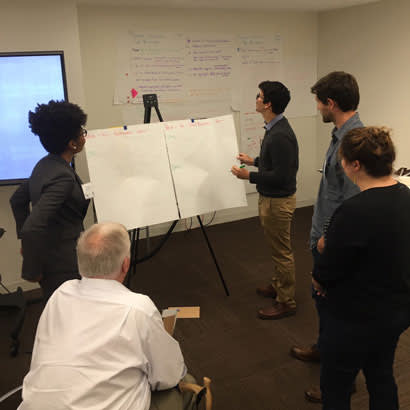
Our research shows the links between green infrastructure in parks and improvements to community health. Building on the momentum behind this research, NRPA and Williamette Partnership hosted a gathering in Washington, D.C., that brought green infrastructure, health and equity professionals together in the same room.
Attendees represented park and recreation agencies from across the country, national health associations, researchers, engineers, water utilities and foundations. Although their work differs, attendees were able to find common ground around green infrastructure in parks as a fundamental solution for communities facing climate related health impacts.
The group worked to identify the most efficient pathways to activate the community benefits of green infrastructure through policy actions and tailored communication tools. Armed with compelling data, tools and information gathered at the workshop, NRPA aims to help park and recreation professionals lead collaborative partnerships that advance green infrastructure in parks.
Collaboration Begins with Unlikely Duos
Before the event even began, we wanted to make sure attendees felt a collaborative energy during the workshop. So, we paired unlikely duos together — like a national environmental health advocate with an on-the-ground ecologist working for a park system — to converse about policies that have made their work easier to accomplish.
Most of these pre-workshop conversations transitioned into learning more about the other’s work, and in some instances, critical resources were shared to help advance the other’s projects. When attendees arrived on the morning of the workshop, they had a friendly face to continue networking with, as well as a new perspective on policy ideas that would shape later conversations.
Taking a Deep Dive into Important Topics
Attendees spent the day in cross-sector teams to maximize creativity and optimize sharing of knowledge. The workshop kicked off with a deep dive into green infrastructure, community benefits and environmental justice to help set the stage for other workshop activities.
The facilitators led attendees through a hard, but crucial, conversation around systemic racism and sexism in America’s environmental movement. This conversation brought to light the misconceptions and stereotypes of underrepresented populations, and the importance of working with these communities to correct the past wrongs that continue to impact their quality of life and social determinants of health.
With these thoughts in mind, the workshop focused on three interactive activities. The first asked participants to imagine and record all the policy avenues to fund and allow for green infrastructure implementation in parks at the local, state and federal levels — even if they weren’t sure how it would work realistically. The second took what was created during the first exercise and identified who would benefit and who would lose if those policies were implemented — to ensure policies had equitable outcomes. The third activity encouraged participants to apply the major policy themes they learned from the first two activities to what is needed to actualize those policies, knowing that these asks will differ depending on the identified audience, such as an elected official or community member.
Moving Green Infrastructure Solutions Forward
The workshop wrapped up by reviewing the main themes of the day. In addition, the individual requests and offers needed to keep the work moving forward and finding policy solutions for more green infrastructure in parks were outlined.
We will also be producing a summary with major findings in Parks & Recreation magazine in the coming months. In addition, we will be hosting several virtual round table discussions to gather more tailored feedback, which will inform our communications toolkit and policy action framework to ensure these resources fill any gaps in the park and recreation field. Continue to follow our progress on the blog, magazine and Parks and Green Infrastructure for Health webpage.
Jenny Cox is NRPA's Conservation Program Manager.

